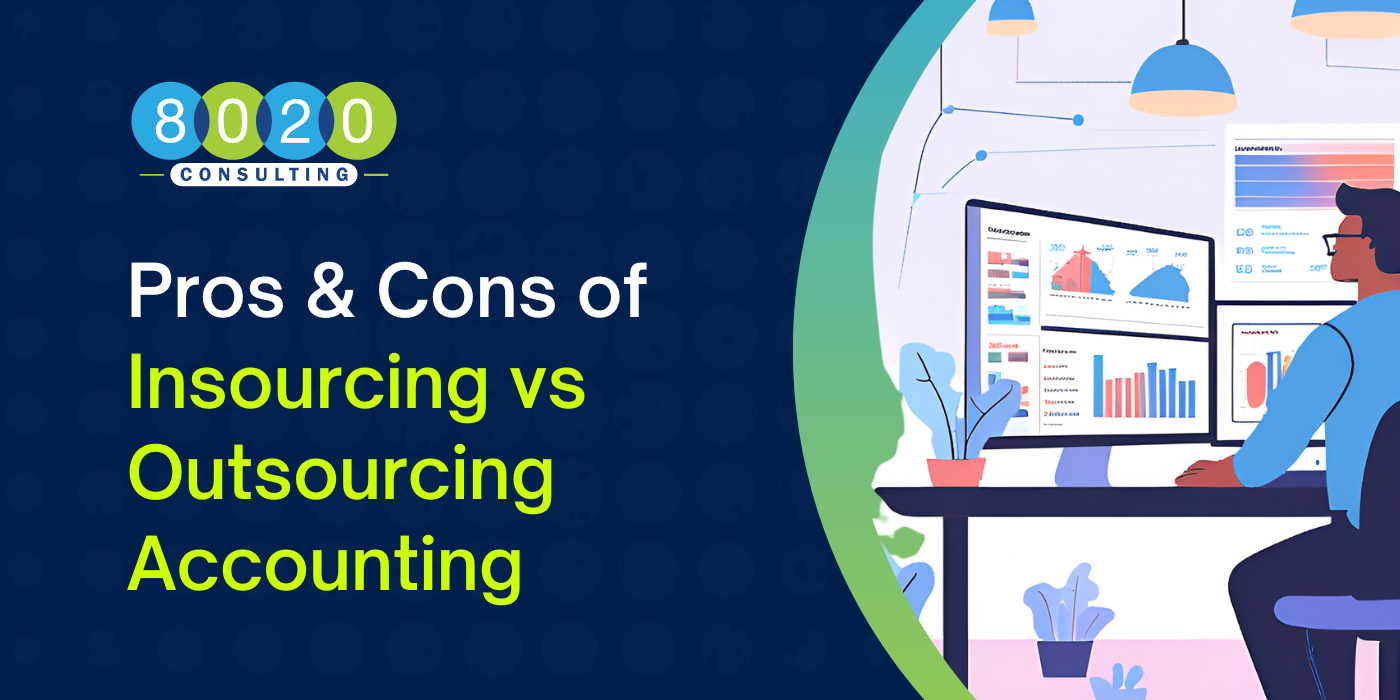
Accounting plays a critical role in maintaining financial accuracy and ensuring regulatory compliance. Businesses have two primary approaches to managing this function: insourcing, where tasks are handled in-house, and outsourcing, where external experts take on the responsibility. While both approaches aim to streamline financial processes, they come with unique advantages and challenges that businesses must carefully evaluate to align with their goals.
Key TakeawaysHere are the key takeaways you should get from reading this article:
|
Table of Contents:
- Insourcing Accounting Services Explained
- Outsourcing Accounting Services Explained
- Insourcing & Outsourcing Comparison
- What to Consider for Large Businesses Choosing Between Insourcing and Outsourcing
Insourcing Accounting Services Explained
Insourcing involves managing accounting operations internally, leveraging an in-house team. This approach provides direct control over processes, systems, and outcomes. For example, a multinational corporation with complex financial reporting needs might establish an internal team to ensure compliance and tailor reporting systems to its requirements. By maintaining accounting functions in-house, businesses gain the flexibility to design solutions specific to their operations while ensuring seamless communication within the organization.
Pros of Insourcing Accounting for Large Businesses
Managing your accounting processes internally has several notable advantages, particularly for organizations that value control and customization. Below are some of the key benefits.
-
Greater Control and Oversight: In-house teams are closely aligned with company goals, offering immediate access to financial insights. This alignment enables swift adjustments to processes and ensures the organization’s objectives are met.
-
Enhanced Data Security: With financial data managed internally, companies can minimize risks associated with third-party breaches. Sensitive information stays within the organization, ensuring greater confidentiality.
-
Customizable Processes and Systems: Insourcing allows businesses to develop accounting practices tailored to their unique needs. This customization is particularly beneficial for enterprises with complex structures requiring unique reporting or compliance systems.
-
Better Collaboration and Communication: Having an internal team fosters improved collaboration across departments, ensuring financial strategies are closely aligned with broader business objectives. This direct communication enhances efficiency and prevents misalignment.
-
Retention of Institutional Knowledge: Internal teams retain knowledge of historical transactions, policies, and processes that can inform future decision-making. This institutional knowledge provides continuity and reduces onboarding times for new team members.
-
Rapid Issue Resolution: With an internal team in place, companies can address accounting and financial issues immediately. This capability reduces downtime and improves efficiency during critical financial operations.
Cons of Insourcing Accounting for Large Businesses
Despite its benefits, insourcing accounting processes can introduce challenges that businesses must weigh against their objectives. Here are some of the primary drawbacks:
-
Higher Operational Costs: Building and maintaining an internal accounting team involves significant costs, including recruitment, training, salaries, and infrastructure. These expenses often escalate as the business grows.
-
Resource Constraints and Scalability Issues: Adapting to fluctuating demands can strain internal resources, especially during seasonal peaks or rapid growth periods. Expanding the team to meet these demands often requires significant investment and time.
-
Talent Acquisition Challenges: Finding skilled accounting professionals with the expertise needed for large-scale operations can be time-consuming and expensive. This challenge is exacerbated when seeking specialists with industry-specific knowledge.
-
Lack of External Perspective: An internal team may lack the diverse experiences and insights that external professionals bring. This limitation can reduce opportunities for innovation in addressing complex financial challenges.
-
Increased Training Requirements: Organizations must invest in continuous training and development for their internal teams to stay updated with changing regulations and industry standards. This ongoing need can divert resources from other critical business areas.
Outsourcing Accounting Services Explained
Outsourcing involves delegating accounting tasks to external providers, offering businesses the flexibility to focus on core operations while accessing specialized expertise. For example, a mid-sized manufacturing company might outsource payroll and tax compliance to streamline processes and allocate resources to strategic initiatives. Outsourcing enables businesses to leverage industry-specific knowledge without the overhead of an in-house team.
Pros of Outsourcing Accounting for Large Businesses
Outsourcing accounting services provides unique benefits for businesses seeking efficiency and access to expertise without expanding internal operations. Below are some key advantages:
-
Cost Savings and Flexibility: Outsourcing eliminates expenses associated with hiring, training, and employee benefits. It also allows businesses to scale services up or down based on current needs, ensuring cost efficiency.
-
Access to Specialized Expertise: External providers bring a wealth of experience in areas such as tax advisory, auditing, and regulatory compliance. This expertise is especially valuable for navigating complex financial landscapes.
-
Focus on Core Business Activities: By delegating routine accounting tasks, companies can allocate resources to strategic priorities. This focus enhances overall productivity and long-term growth potential.
-
Access to Advanced Technology: Many outsourcing firms utilize cutting-edge accounting software and tools. This access allows businesses to benefit from technologies that may be cost-prohibitive to implement in-house.
-
Mitigation of Talent Shortages: Outsourcing partners often have large pools of experienced professionals. This ensures consistent service delivery even during periods of high demand or labor shortages.
-
Improved Scalability: Outsourcing providers can quickly adjust their level of service to meet a company’s changing needs. This flexibility allows businesses to scale up or down without the constraints of hiring or downsizing staff.
Cons of Outsourcing Accounting for Large Businesses
While outsourcing can provide flexibility and expertise, it also comes with potential drawbacks that businesses need to address to ensure successful implementation. Below are the key challenges:
-
Potential Data Security Risks: Sharing sensitive financial information with external providers introduces risks of data breaches and confidentiality issues. Companies must choose reputable providers and establish clear data-sharing protocols.
-
Reduced Control and Responsiveness: Outsourcing can limit direct oversight of accounting processes, potentially affecting agility in addressing urgent financial matters. This lack of immediate control can lead to delays in resolving critical issues.
-
Quality and Consistency Issues: Service quality may vary, particularly during transitions between providers or teams. Clear performance metrics and regular reviews can help mitigate these risks.
-
Loss of Institutional Knowledge: Over time, reliance on external providers can erode institutional knowledge. Maintaining detailed records and ensuring knowledge transfer processes are in place can address this challenge.
-
Dependency on External Partners: Relying heavily on outsourcing providers may create a dependency that can be challenging to manage if contractual terms change or services are disrupted.
-
Limited Customization: Outsourced accounting processes may not always align perfectly with a company’s specific needs. Businesses should work closely with providers to tailor services where possible.
Insourcing & Outsourcing Comparison
| Insourcing | Outsourcing | |
|---|---|---|
| Pros |
|
|
| Cons |
|
|
| Best For | Businesses seeking control, data security, and long-term stability in financial operations. |
Companies needing cost efficiency, scalability, or access to specialized expertise and advanced tools. |
What to Consider for Large Businesses Choosing Between Insourcing and Outsourcing
There is no uniform answer to whether insourcing or outsourcing is the right approach for your business. Each organization must weigh the pros and cons of both options to determine which aligns best with its goals, resources, and operational needs. Considerations such as scalability, compliance requirements, and risk management play a critical role. The decision should be informed by a thorough evaluation of both financial and non-financial factors. Below is a list of key attributes to assess when choosing the best accounting model for your business:
-
Cost-Benefit Analysis: Assess the long-term ROI by comparing upfront costs against potential savings and efficiencies. Consider both fixed and variable expenses associated with each approach.
-
Risk Management and Data Security: Evaluate how each option aligns with your company’s risk tolerance. Consider the safeguards in place for data confidentiality and potential vulnerabilities in outsourcing agreements.
-
Industry-Specific Needs and Compliance: Ensure the chosen model meets your industry’s regulatory and operational requirements. Certain industries may benefit more from in-house expertise, while others may prefer external specialization.
-
Scalability and Adaptability: Determine how well each approach supports your business’s growth and ability to handle dynamic financial needs. Outsourcing may offer quicker scalability, while insourcing provides long-term stability.
-
Control and Oversight: Understand the level of direct control needed over your accounting processes. Insourcing offers greater oversight, whereas outsourcing might limit day-to-day management but improve focus on strategic initiatives.
-
Access to Expertise and Technology: Assess how each option provides access to specialized skills and advanced tools. Outsourcing may introduce cutting-edge technologies that are expensive to implement in-house.
-
Cultural and Operational Alignment: Evaluate how well external providers or an in-house team aligns with your company’s values, communication style, and operational goals. Misalignment can lead to inefficiencies or conflicts., weighing upfront costs against potential savings and efficiencies.
Find the Right Accounting Solution with 8020 Consulting
Complex project accounting often requires specialized expertise. At 8020, I’ve worked alongside organizations to help them implement effective systems tailored to their needs. Our team of experienced consultants integrates seamlessly with your operations, ensuring compliance, streamlining processes, and enhancing financial outcomes.
By partnering with 8020, you can tackle even the most challenging financial projects with confidence. Let’s work together to ensure your project accounting delivers measurable results, helping you focus on what matters most—achieving your goals.




